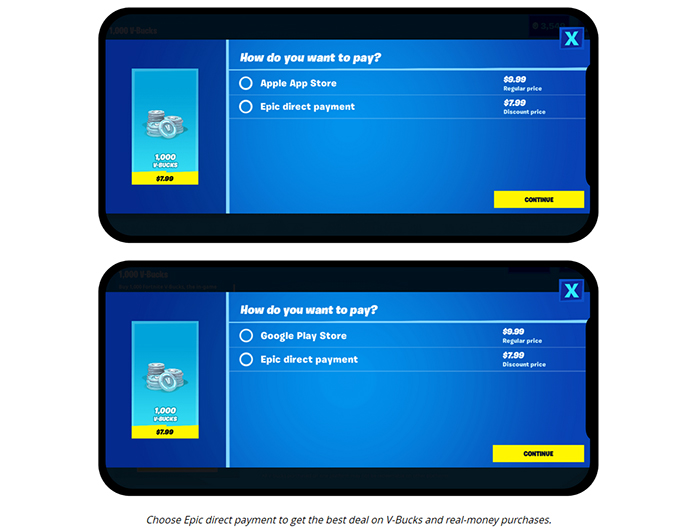A big gaming industry storm has begun due to moves made by Epic Games. Fortnite maker Epic kicked off a sale of sorts yesterday. It began the Fortnite Mega Drop where you could get 20 per cent off your V-Bucks purchases, a considerable saving. However, there was one big snag for mobile app store operators like Apple and Google - to save the 20 per cent mobile gamers would need to select the direct payment to Epic option, thus swerving the "exorbitant 30 per cent fee on all payments," levied by Apple/Google. The currency sale also encompassed platforms such as PlayStation, Xbox, Nintendo, PC and Mac for fairness.

Apple pulled Fortnite from its App Store pretty swiftly once it became aware of what had been implemented. Gaming mag Polygon got a quote from Apple about its reaction, and it is rather predictable. "Epic Games took the unfortunate step of violating the App Store guidelines that are applied equally to every developer and designed to keep the store safe for our users. As a result their Fortnite app has been removed from the store," wrote Apple in a statement. Apple asserted that Epic's change had been done to violate the guidelines and the app update that implemented the direct payments had not been "reviewed or approved by Apple."
A couple of hours after the Apple reaction, Google followed suit by removing Fortnite downloads from its Play Store. Google reminded industry watchers that Fortnite would still be available on Android through multiple app stores but that the change violated its "consistent policies that are fair to developers and keep the store safe for users."
Both Apple and Google ended their statements about the Fortnite ban by saying that they would work closely with Epic to resolve issues and return the popular game to their walled garden mobile stores.

Above you will have read Apple's and Google's reactions and they are pretty similar. But what of Epic? As you might expect, Epic Games and its vocal CEO Tim Sweeney have been banging the 'healthy competition' drum pretty hard. Sweeney took to Twitter to deny that Epic was looking for special treatment (like Amazon has) but wants policy changes to benefit all developers.
Epic has thus decided to pursue lawsuits against Apple and Google for anticompetitive business practices. The Fortnite maker isn't looking for monetary compensation in this suit, rather a ruling to put an end to the monopolistic practices of Apple and "fake open system" of Android.
Of course there is a lot of gains/losses to be made by developers and app store owners with a view to the result. In Epic's case, market metrics firm Sensor Tower observes that in July there were 2m downloads of Fortnite and it brought in $34m revenue (via Apple's App store alone). 30 per cent of that monthly figure is a significant sum.













